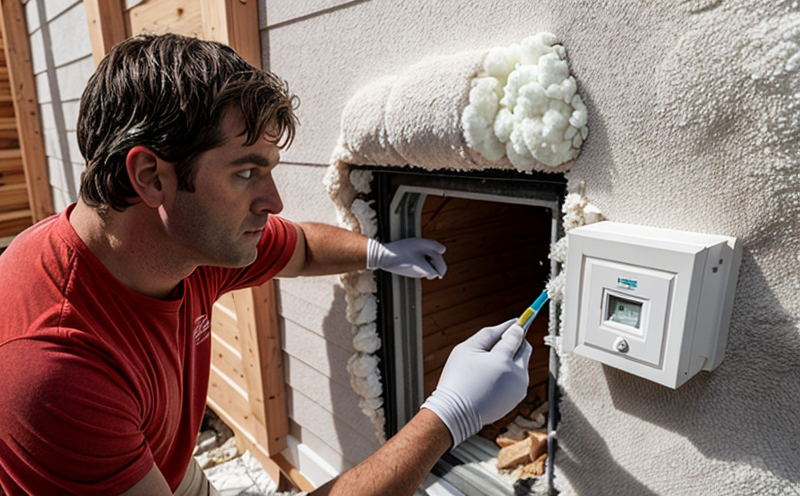ISO 8990 Thermal Conductivity Assessment of Materials
The assessment of thermal conductivity using ISO 8990 is a critical step in ensuring that materials used in building and infrastructure projects meet the necessary performance standards. This standard provides guidelines for determining the thermal conductivity, λ (lambda), of homogeneous materials with a regular shape at temperatures ranging from -15°C to +35°C. The test is particularly important for insulation materials such as foams, cellular plastics, and other materials that need to maintain their insulative properties under varying environmental conditions.
Thermal conductivity testing is essential in the building & infrastructure sector because it directly impacts energy efficiency, cost-effectiveness, and sustainability. Insulation plays a vital role in reducing heating and cooling loads, which can lead to significant savings on utility bills. By ensuring that materials meet specified thermal conductivity levels, we help clients achieve their sustainability goals while also enhancing the comfort of occupants within buildings.
The test is conducted using a guarded-hot-plate apparatus which simulates real-world conditions where heat transfer through insulation occurs. During this process, an electrical heater warms one side of a sample while keeping the other side at a constant temperature. The difference in temperature between these two sides allows us to calculate the thermal resistance (R-value), from which we can derive the thermal conductivity.
The accuracy and precision of ISO 8990 are paramount, especially when dealing with small variations that could indicate non-compliance or superior performance. Our laboratory adheres strictly to this standard, ensuring accurate measurements every time. This allows us to provide reliable data for your projects, helping you make informed decisions about the materials used.
For R&D engineers involved in developing new insulation products, ISO 8990 offers a standardized method to compare their prototypes against existing benchmarks. Compliance officers can use these results as part of their quality assurance processes, while procurement teams benefit from knowing that they are selecting high-performance materials for their projects. Overall, this test ensures that all stakeholders involved have confidence in the integrity and efficacy of the insulation being used.
Applied Standards
The ISO 8990 standard is widely recognized as a reliable method for measuring thermal conductivity across various industries. It has been adopted by many countries around the world, including those in Europe (EN 12667), Asia-Pacific regions like China and Japan, and North America. This global acceptance ensures consistency in testing procedures worldwide.
Some key points about ISO 8990 include:
- The test method is applicable to homogeneous materials with a regular shape.
- It covers the determination of thermal conductivity between -15°C to +35°C.
- A guarded-hot-plate apparatus is used for the measurement process.
To ensure that your samples meet specific requirements, it's important to understand the parameters involved. These may vary depending on the material type and intended application within buildings or infrastructure projects. For instance, certain types of insulation might have stricter limits on their thermal conductivity values due to regulatory requirements or design specifications.
Scope and Methodology
ISO 8990 specifies the procedure for measuring thermal conductivity by guarded-hot-plate apparatus. The scope includes:
| Parameter | Description |
|---|---|
| Sample Preparation | The sample must be cut into rectangular or circular pieces, depending on the test setup. |
| Heating and Cooling Rates | The heating rate should not exceed 1 K/min while cooling occurs at a similar speed. |
| Temperature Range | The temperature difference between the hot and cold sides of the sample must be within -15°C to +35°C. |
| Data Collection | Continuous monitoring of temperatures and power consumption is required throughout the test duration. |
In practice, our laboratory prepares samples according to these guidelines before placing them into a controlled environment where they undergo heating or cooling cycles. We then measure both the temperature differences across the sample as well as the electrical power supplied during this process. From here, we calculate the thermal resistance and subsequently the thermal conductivity using established formulas.
Our rigorous adherence to ISO 8990 guarantees that our findings are accurate, repeatable, and consistent with industry standards. This approach ensures that you receive reliable data upon which you can base important decisions regarding material selection for your projects.
Why Choose This Test
Accurate Results: Our laboratory uses state-of-the-art equipment and follows strict protocols to ensure precise measurements of thermal conductivity.
Compliance Assurance: By meeting the requirements set forth by ISO 8990, you can be confident that your materials will comply with relevant regulations globally.
Besides providing accurate results and ensuring compliance, choosing this test also offers several other advantages:
Cost-Effective Solutions: Insulating correctly reduces long-term energy costs for buildings.
Sustainability Focus: Properly insulating structures helps reduce carbon footprints by minimizing unnecessary heating or cooling demands.
In summary, choosing ISO 8990 thermal conductivity assessment ensures that you select the most effective insulation materials available, leading to lower operational costs and more sustainable construction practices. With our expertise in this area, we can help your organization achieve these benefits while maintaining regulatory compliance.





